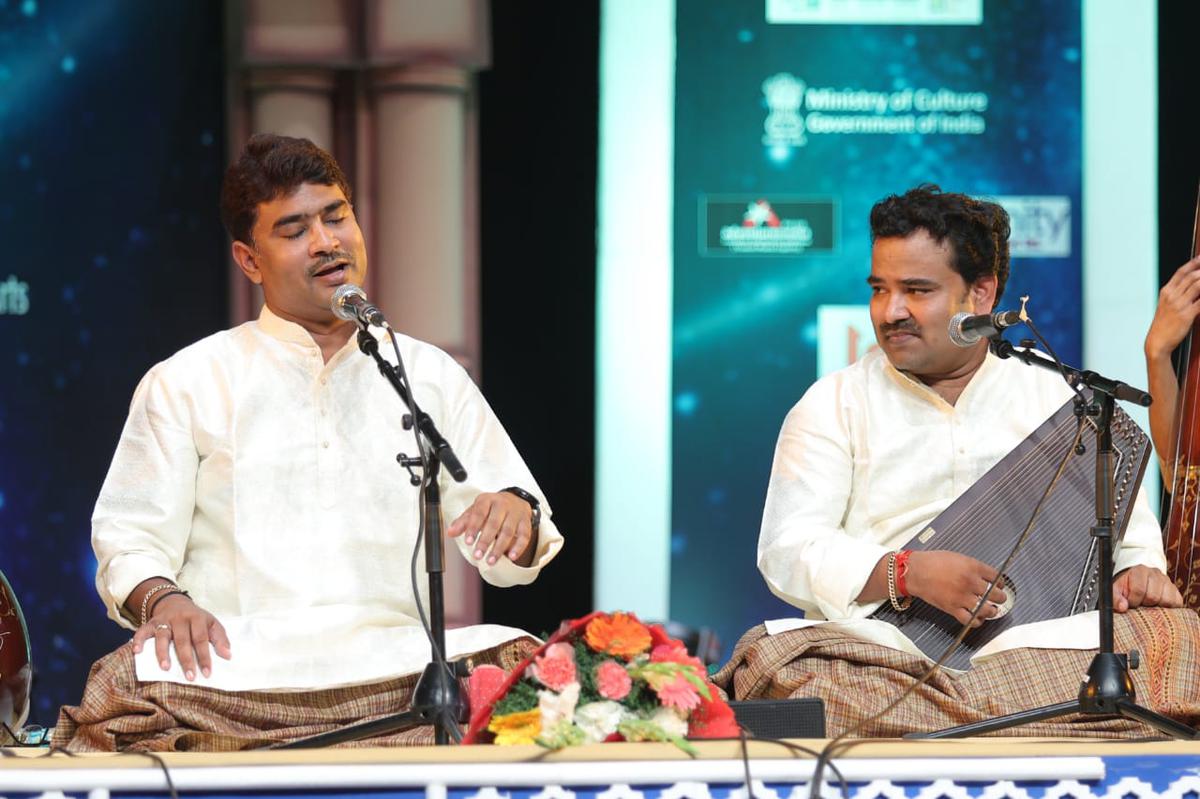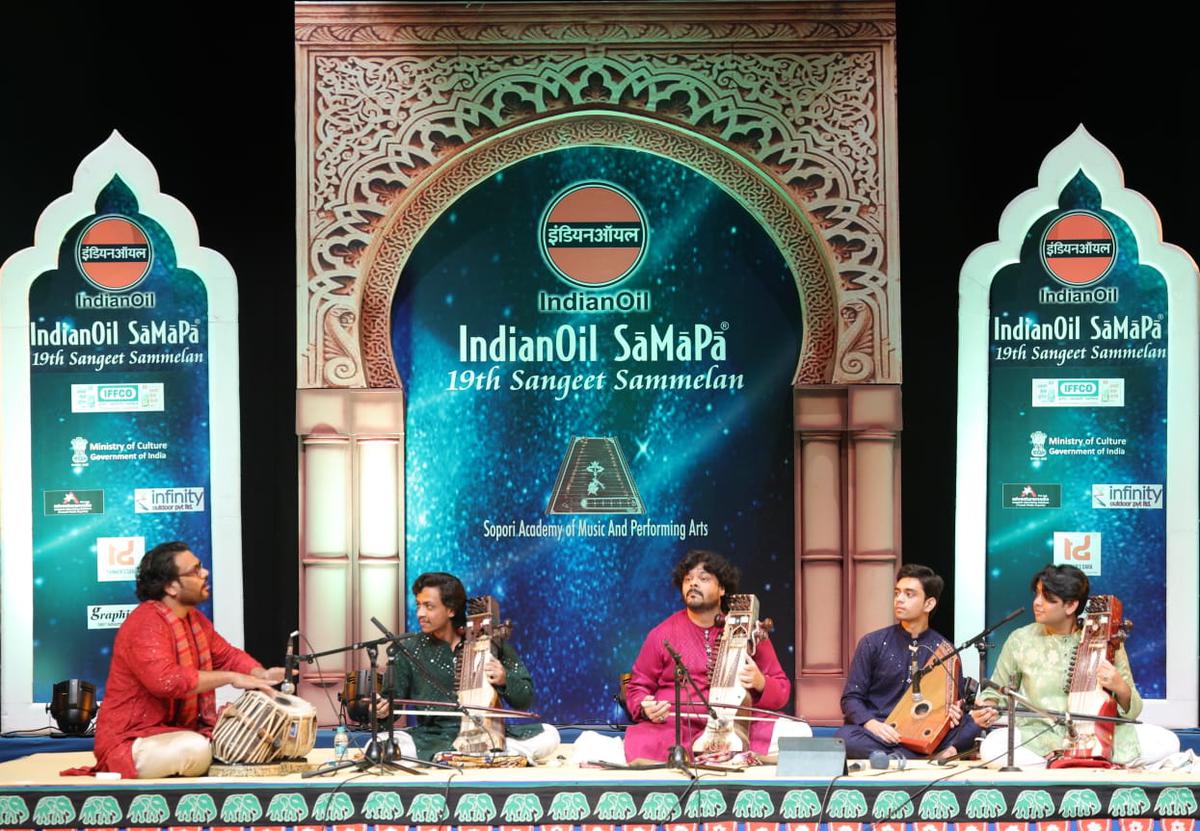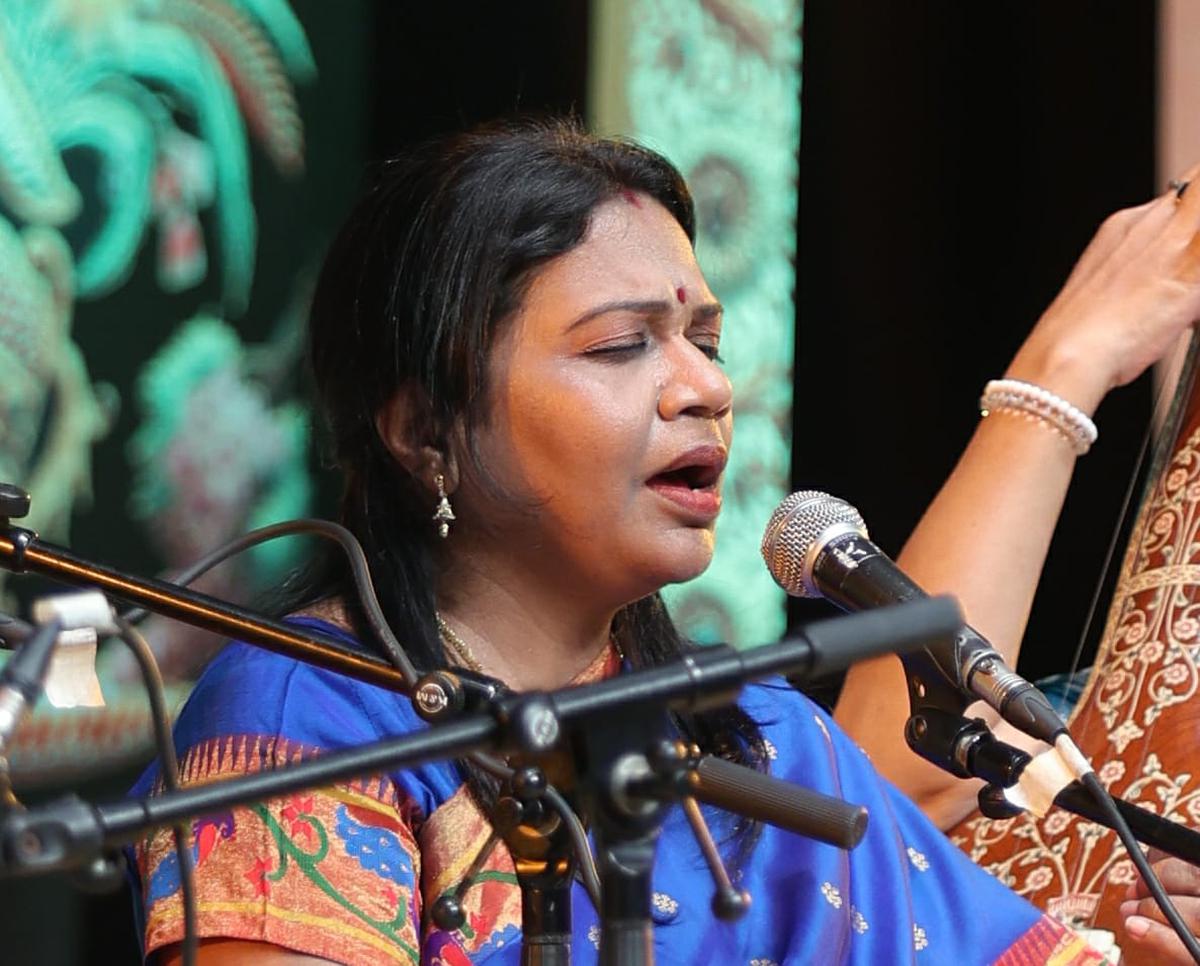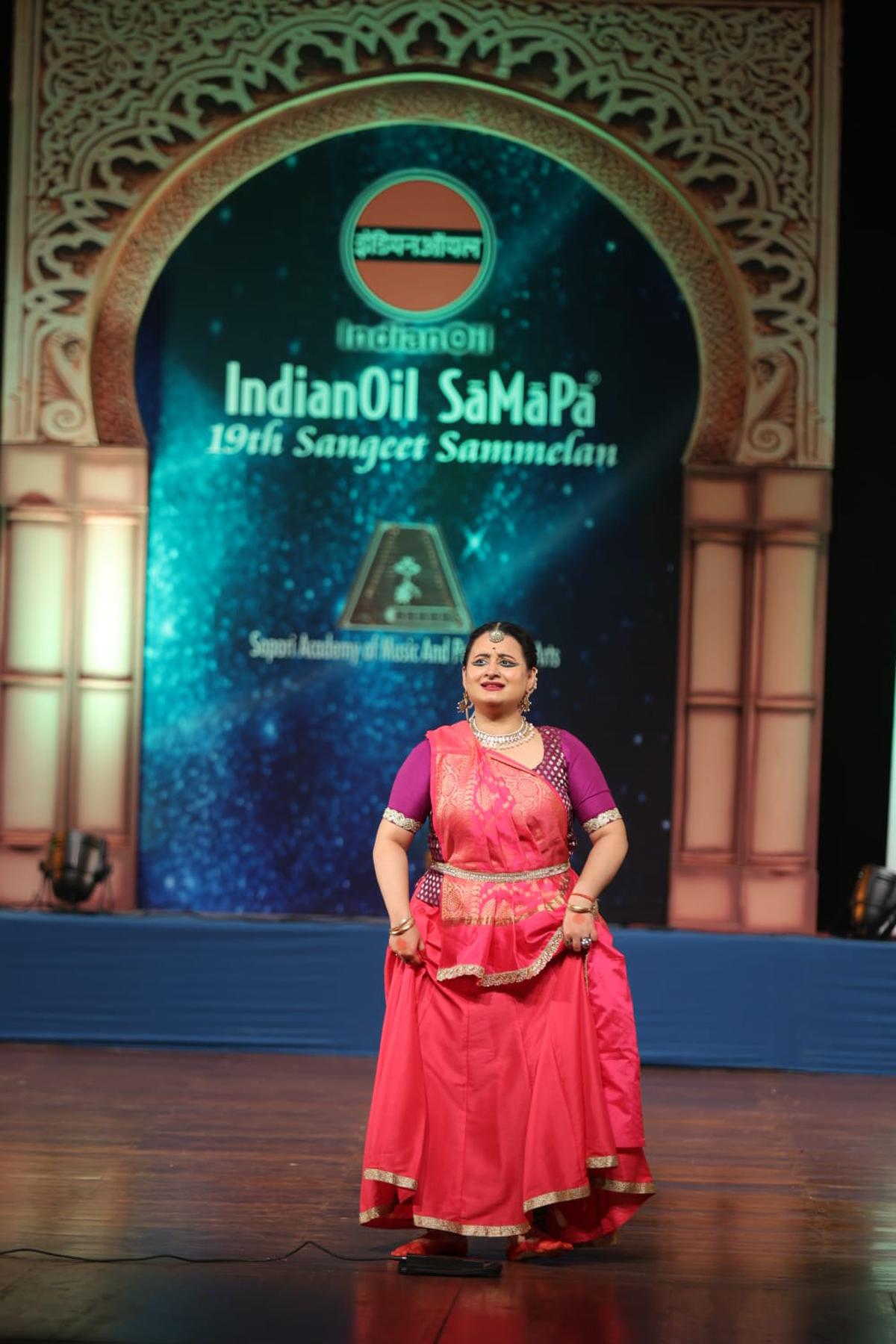The Sopori Academy of Music and Performing Arts or Sa Ma Pa was established by the late Pt. Bhajan Sopori with the motto of ‘Jan jan tak sangeet’ — Music to the masses. This was also the guiding principle of the ‘Sa Ma Pa Sangeet Sammelan’, started in New Delhi nearly two decades ago by Pt. Bhajan Sopori.
Hailing from the Sufiana Gharana of santoor from Srinagar, Pt. Bhajan Sopori was an excellent santoor player and composer. He created raags such as Nalleshwari, Patawanti, Nirmal-Ranjani and Hemraatri.
A dedicated guru, he also improved the instrument for techniques such as meend and gamaka, which were near impossible to play on it earlier.
After Pt. Bhajan Sopori’s demise and the Covid pandemic, the event was put on pause.
It was heartening to see Abhai Rustam Sopori mature as a musician and composer in the footsteps of his versatile father, the late Pt. Bhajan Sopori, during the 19th edition of the Sa Ma Pa Sangeet Sammelan held recently at Kamani Auditorium, New Delhi.
On the concluding night of the three-day festival, begun by his father, Abhai offered a musical tribute to his father and guru with his creation of raag Bhajaneshwari, and composition ‘Tore bina main kuchh bhi nahin/tu hai data, tu hi gyata/ Kripa karo hey guruvara!’, set to Ektaal.
Elaborating on Bhajaneshwari, which he describes as an evening raag, Abhai said the “lower octave has the serenity that brings forth the element of my Guru’s sober temperament”. He then played Bhajaneshwari with a detailed aalap-jod-jhala and a slow gat in Jhaptaal, and his own composition set to medium tempo Ektaal, and a fast gat set to drut Teentaal.
This was followed by Nirmal Kauns, another raag that he created for Ma Nirmala Devi. Abhai was ably accompanied on the tabla by Ustad Rafiuddin Sabri and on the pakhawaj by Rishi Shankar Upadhyaya.
Virja Joshi, grandson of Pt. Bhimsen Joshi
| Photo Credit:
Special Arrangement
Viraj Joshi, the young grandson of Pt. Bhimsen Joshi sounded unsure when he opened with raag Maru Bihag, but gradually gained confidence and concluded with the Bhajan ‘Baje re muraliya baaje’ immortalised by his grandfather.
The sangeet sammelan concluded with an impressive rendering of raag Kausi-Kanda by SNA Bismillah Khan Yuva Puraskar awardees Prabhakar and Divakar Kashyap. They were accompanied on the tabla by Hari Om Hari and on the harmonium by Vinay Mishra.

Kashyap Brothers – Prabhakar and Kashyap.
| Photo Credit:
Special; Arrangement
The Sa Ma Pa Awards-2023 conferred this year comprised ‘Vitasta Samman’ to Pt. Dal Chand Sharma, ‘Kala-Vardhan Samman’ to Rosalin Patasani Mishra from Parichay Foundation, Odisha, ‘Acharya Abhinavgupt Samman’ to Avatar Krishna Mota, ‘Nund Rishi Samman’ to Shahnawaz Rasheed (Kashmiri poet), ‘Sangeet Tejasvi Samman’ to Prabhakar Kashyap and Shri Diwakar Kashyap, ‘Yuva Ratna Samman’ to Viraj Joshi and the ‘Sa Ma Pa Award for Excellence’ to former Doordarshan newsreaders Sadhana Shrivastava.
The Sammelan’s focus this year was on showcasing established artistes of the present generation along with up-and-coming talents. The invocatory Saraswati Vandana on the inaugural evening was followed by the itar recital by Ankush N. Nayak, a disciple of Ustad Ruffique Khan of Dharwad gharana. Ankush played raag Puriya Kalyan complete with aalap-jod-jhala followed with a slow and medium tempo composition. He was accompanied on the tabla by Ustad Akram Khan.
The melodious Maru Bihag by Murad Ali Khan, a well known sarangi player of the Muradabad gharana of famed sarangi players,played a melodious Maru Bihag. Accompanied on the tabla by Aman Ali, Murad’s masterly performance was ably matched by the two youngsters Shahnawaz Ali and Subhan Ali, assisting him on this challenging instrument.

Mural Ali
| Photo Credit:
Special Arrangement
Among the present generation of Hindustani classical vocalists, Shashwati Mandal commands special attention. The granddaughter of Balabhau Umedkar, an erudite musician of the Gwalior gharana, and the court musician of Gwalior state, she was initiated into classical music by her mother Kamal Umedkar Mandal and was further groomed under Bala Saheb Poochhwale in the tappa and khayal genres. That she has a rich repertoire was visible in her choice of ragas and compositions presented that evening.

Shaswati Mondal
| Photo Credit:
Special Arrangement
Opening with the timely raag Jhinjhoti, Shashwati presented ‘Saanvaro mann bhayo’, a traditional composition by Pt. Ratanjankar as Bada khayal and ‘Kahe karat kanhai chaturai’, composed by Pt. Dinkar Kaikini for Chhota khayal, and did full justice to the Ashtanga (eight-fold) gayaki of the Gwalior gharana. This was followed with the traditional Tappa ‘Ho miyan jaanewale’ in Kafi, entailed with a sprightly bandishi thumri ‘Chhando chhando chhaila mori baiyan’ in drut Teentaal.
‘Swar-Laya-Samvad’ conceived and directed by Pt. Vijay Shankar Mishra featured some rare instruments such as the sursingar and surbahar, which are fast disappearing from the concert circuits. Joydeep Ghosh on the sursingar and sarod, Shyam Rastogi on the surbahar and sitar, accompanied by Ankit Parikh on the pakhawaj and Ujit Uday on the tabla played raag Malkauns in the typical Dhrupad style. The aalap and compositions set to Chautaal and Sultaal followed with a couple of songs in raag Bageshri, set to Jhaptaal and Tritaal.

Ragini Maharaj
| Photo Credit:
Special Arrangement
There was sadly a very thin audience for this presentation.
The next day opened with a Mohan Veena recital by Ajay P. Jha and concluded with a graceful Kathak performance by Deepak Maharaj and his daughter Ragini, the son and granddaughter of Pt. Birju Maharaj, respectively.
Vidushi Shubhra Guha was the star musician of this evening. Accompanied on the tabla by Ram Kumar Mishra, sarangi by Murad Ali, and harmonium by Zakir Dhaulpuri, she presented raag Shuddha Kalyan as her main. The detailed ‘Nom-Tom’ aalap, typical of the Agra gharana, augmented the flavour of Agra gayaki during the khayal rendition as well. Shubhra was ably assisted with vocal support by her disciple Sabeena Mumtaz. One only wished she had not chosen Jhinjhoti for her second raag, to avoid repetition of the previous evening.